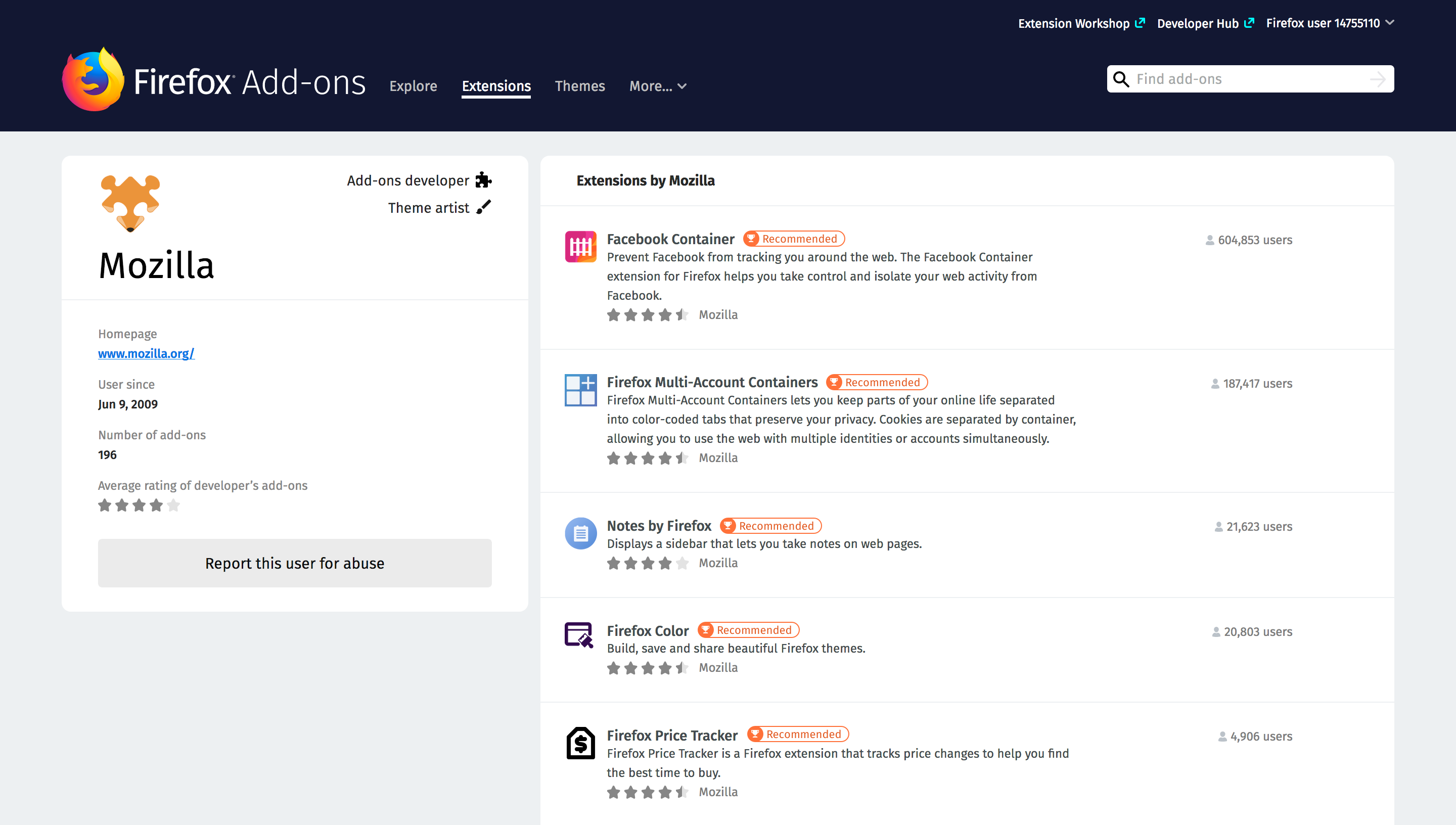In February, we blogged about the challenge of helping extension users maintain their safety and security while preserving their ability to choose their browsing experience. The blog post outlined changes to the ecosystem to better protect users, such as making them more aware of the risks associated with extensions, reducing the visibility of extensions that haven’t been vetted, and putting more emphasis on curated extensions.
One of the ways we’re helping users discover vetted extensions will be through the Recommended Extensions program, which we’ll roll out in phases later this summer. This program will foster a curated list of extensions that meet our highest standards of security, utility, and user experience. Recommended extensions will receive enhanced visibility across Mozilla websites and products, including addons.mozilla.org (AMO).
We anticipate the eventual formation of this list to number in the hundreds, but we’ll start smaller and build the program carefully. We’re currently in the process of identifying candidates and will begin reaching out to selected developers later this month. You can expect to see changes on AMO by the end of June.
How will Recommended extensions be promoted?
On AMO, Recommended extensions will be visually identifiable by distinct badging. Furthermore, AMO search results and filtering will be weighted higher toward Recommended extensions.
Recommended extensions will also supply the personalized recommendations on the “Get Add-ons” page in the Firefox Add-ons Manager (about:addons), as well as any extensions we may include in Firefox’s Contextual Feature Recommender.
How are extensions selected to be part of the program?
Editorial staff will select the initial batch of extensions for the Recommended list. In time, we’ll provide ways for people to nominate extensions for inclusion.
When evaluating extensions, curators are primarily concerned with the following:
- Is the extension really good at what it does? All Recommended extensions should not only do what they promise, but be very good at it. For instance, there are many ad blockers out there, but not all ad blockers are equally effective.
- Does the extension offer an exceptional user experience? Recommended extensions should be delightful to use. Curators look for content that’s intuitive to manage and well-designed. Common areas of concern include the post-install experience (i.e. once the user installs the extension, is it clear how to use it?), settings management, user interface copy, etc.
- Is the extension relevant to a general audience? The tightly curated nature of Recommended extensions means we will be selective, and will only recommend extensions that are appealing to a general Firefox audience.
- Is the extension safe? We’re committed to helping protect users against third-party software that may—intentionally or otherwise—compromise user security. Before an extension receives Recommended status, it undergoes a security review by staff reviewers. (Once on the list, each new version of a Recommended extension must also pass a full review.)
Participation in the program will require commitment from developers in the form of active development and a willingness to make improvements.
How will the list be maintained?
It’s our intent to develop a Recommended list that can remain relevant over time, which is to say we don’t anticipate frequent turnover in the program. The objective is to promote Recommended extensions that users can trust to be useful and safe for the lifespan of the software they install.
We recognize the need to keep the list current, and will make room for new, emerging extensions. Firefox users want the latest, greatest extensions. Talented developers all over the world continue to find creative ways to leverage the powerful capabilities of extensions and deliver fantastic new features and experiences. Once the program launches later this summer, we’ll provide ways for people to suggest extensions for inclusion in the program.
Will the community be involved?
We believe it’s important to maintain community involvement in the curatorial process. The Community Advisory Board—which for years has contributed to helping identify featured content—will continue to be involved in the Recommended extensions program.
We’ll have more details to share in the coming months as the Recommended extensions program develops. Please feel free to post questions or comments on the add-ons Discourse page.

Sylvain Giroux wrote on
wrote on
neil wrote on
wrote on
Scott DeVaney wrote on
wrote on
Nathar Leichoz wrote on
wrote on
rugk wrote on
wrote on
Scott DeVaney wrote on
wrote on
Grant wrote on
wrote on
hellosct1 wrote on
wrote on
V wrote on
wrote on
Hansi wrote on
wrote on
Caitlin Neiman wrote on
wrote on
Glenn Sharp wrote on
wrote on
Caitlin Neiman wrote on
wrote on
Glenn Sharp wrote on
wrote on
Caitlin Neiman wrote on
wrote on
ahsan kamal wrote on
wrote on
Glenn wrote on
wrote on
Pam wrote on
wrote on
Pam wrote on
wrote on
Caitlin Neiman wrote on
wrote on
Mike wrote on
wrote on